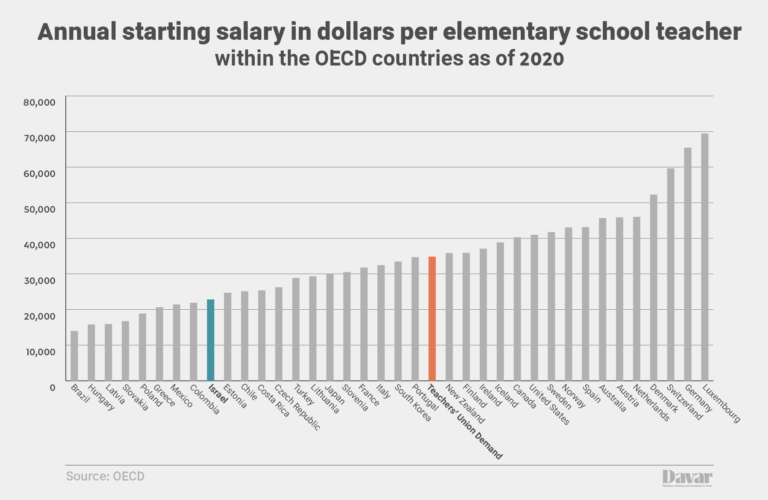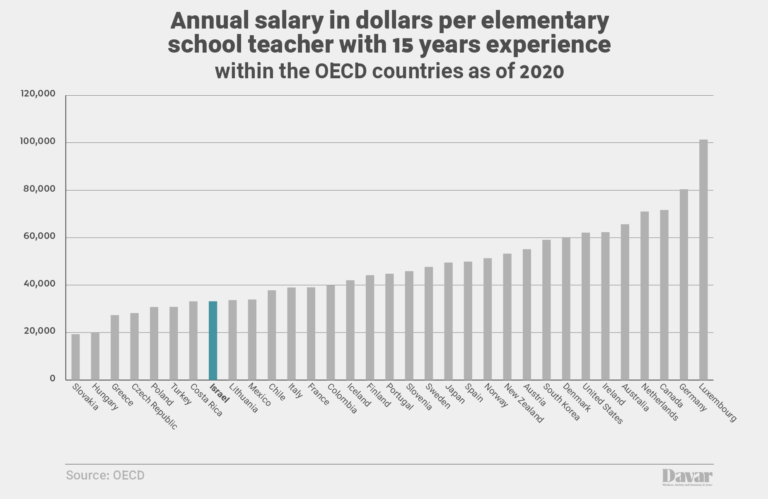
It is important for Finance Minister Avigdor Lieberman and his ministry officials to make it clear that raising teachers’ salaries is not the main issue in the negotiations on the next salary agreement.
“There is no debate about raising teachers’ salaries. The controversy is over vacation days, layoffs and rewards for excellence,“ Lieberman said at a news conference this week, referring to salaries as a small detail that should be closed.
These statements imply that there is already extensive agreement between the parties on the issue of wages, but the reality is very far from that. The negotiation meetings are being conducted lazily, and so far the Ministry of Finance has not passed any number, or specified any economic demand.
No change can take place without a fair salary for teachers
In the negotiating chambers, finance officials claim they are limited because there is not yet a state budget for next year, although the order of it all is reversed: the next budget should be written based on collective agreements and legislation. Even the demands for structural changes, such as changing vacations, were mostly conveyed through the media.
It is quite possible that the structural changes are important to the Ministry of Finance, but the attempt to dwarf the issue of wages is not accidental. The controversy over vacation days is more convenient for the Finance Ministry than the question of what the amount on the payslip will be.

The demands for change allow the Finance Ministry to leverage pressure in negotiations, creating an image in which teachers deal with money, while finance officials have greater ambitions for changing the education system (in this context, it is worth noting that the changes in question were not proposed by education professionals).
In the same way, an imaginary separation is created between the teachers’ educational action and their payslips. But the bottom line on the slip is the most important statistic for the education system. It determines how many teachers there will be, who will choose to be a teacher, and how high-quality the training can be. It shapes the role of the teacher, determines their status and their lifestyle.
There are many changes required in the education system, but none of them will be able to exist without a fair salary for teachers. Elementary and middle schools are suffering from a huge shortage of teachers, and a constant flight of staff. Without a significant improvement in wages, there will be no one to reform with.
Wages should catch up with rising prices
Those who have already started talking in numbers are the Teachers’ Union, which stated a sum of 10,000 shekels per starting teacher as a first condition. Apparently this is a significant wage jump. The salary of a beginning teacher today is 6,800 shekel per month. An additional 3,200 shekel a month is a 47% increase in salary. But if you put the data in a broader context, this is not an unusual increase.
First of all, the starting salary of teachers in Israel is one of the lowest in the OECD countries: 29th out of 37, between Colombia and Estonia. If the salary increases in accordance with the requirements of the Teachers’ Union, it will slightly exceed the average as of 2020 (the requirement is equivalent to $36,000 per year, when the average was about $34,000 per year). However, 2020 is the last year for which data was available, and it can be assumed that since then wages have risen even more, so it is likely that in practice the Teachers’ Union’s requirement is slightly below average.

If all the salary components are taken into account, and not just the base salary, the position of the starting teacher’s salary in Israel in relation to their counterpart in the world should improve. But in practice, teachers in Israel find it difficult to get a full-time job because of the structure of employment, and also face a classroom for many more hours than their peers around the world.
The second thing to consider is the high inflation environment. The teachers’ previous wage agreement expired in 2019, and in the last year alone, prices have risen by 4%. Expectations are that inflation will remain in the 3% range for the next five years. The practical implication is that teachers' real salaries have already begun to erode, and will continue to erode.
Such an inflationary environment requires higher wage increases than those to which the economy has become accustomed in recent years. Otherwise, the wage increase will lose relevance in a short time. And in any case, 10,000 shekels is still below the average wage in the economy – 12,052 shekels as of February, a figure that itself is expected to continue to climb.
In recent weeks, there have been repeated claims about the gap between the salaries of new and veteran teachers, which implies that the salary increase is required only for new teachers. But the attempt to separate the old teachers from the new teachers is also misleading. Without going into the question of how to properly reward seniority, the salary of a teacher after 15 years in the Israeli education system is also low relative to the world, 27th out of 34 in OECD countries.

It is possible that at the top end of seniority there are teachers who earn slightly above the OECD average. But the solution should be the opposite: all teachers in Israel should earn above the OECD average. Israel, once an educational powerhouse that placed its insurers in the high-tech industry, cannot afford to continue lagging behind.
Bring teachers back to the middle class
There is also a small detail that is absent from the discourse. Israel has handsome tax revenues, and it can raise the salaries of teachers and public sector workers without imposing new taxes, and even without requiring an expansionary economic policy.
For the Ministry of Finance, this is a problematic detail. It is easier to negotiate when there is no money in the catalog. But the data on the state budgets are published every month. According to the current rate of tax collection, the year will end with a collection surplus of tens of billions of shekels. There is no better way to spend these sums, morally and economically, than to return teachers in Israel to the middle class.
This article was translated from Hebrew by Matt Levy.






